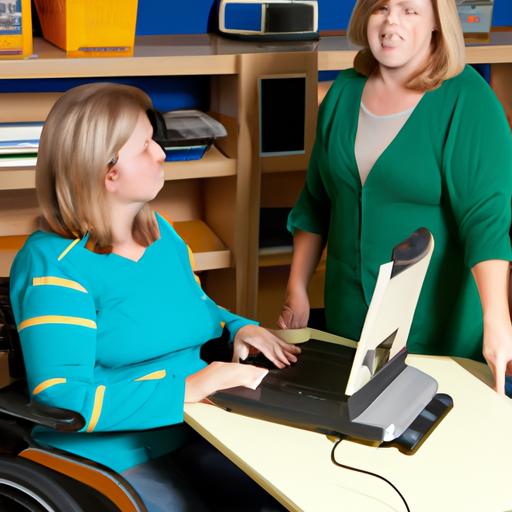Introduction
As a teacher and financial advisor, I have witnessed the tremendous impact that education can have on individuals’ lives. One field that particularly stands out is special education, where dedicated professionals help students with unique abilities thrive academically, socially, and emotionally. Pursuing a bachelor of special education degree equips aspiring educators with the necessary skills and knowledge to make a lasting difference in the lives of these exceptional learners. In this article, we will delve into the intricacies of a Bachelor of Special Education program, explore the skills and knowledge gained, discuss career opportunities, and shed light on the significance of this field.

Understanding the Bachelor of Special Education Program
Curriculum and Coursework Requirements
The Bachelor of Special Education program offers a comprehensive curriculum designed to prepare future educators for the diverse needs of students with disabilities. Core courses delve into topics such as inclusive education, behavior management, assessment techniques, and individualized educational plans. Additionally, students may have the opportunity to specialize in areas such as autism spectrum disorders, learning disabilities, or emotional and behavioral disorders, allowing them to hone their expertise in specific domains.
Specializations and Elective Options Available
To cater to the diverse interests and career goals of students, Bachelor of Special Education programs often offer a range of specializations and elective options. These specializations allow aspiring educators to gain deeper insights into specific areas of special education, such as assistive technology, early intervention strategies, or gifted education. By choosing elective courses aligned with their passions, students can tailor their education to suit their desired career path within the field of special education.
Duration and Academic Structure
The duration of a Bachelor of Special Education program typically spans four years, although some institutions may offer accelerated or part-time options. The academic structure combines classroom instruction with practical field experiences, providing students with hands-on opportunities to apply their learning in real-world settings. These field experiences, often in the form of internships or student teaching placements, allow students to observe and actively engage with students with disabilities under the guidance of experienced educators.

Skills and Knowledge Gained
Development of Skills Essential for Special Education Teachers
A Bachelor of Special Education program equips students with a wide range of skills essential for success in the field. Effective communication and interpersonal skills are emphasized, enabling future educators to collaborate with students, parents, and other professionals involved in a student’s education. Additionally, special education teachers develop strong organizational and multitasking abilities as they navigate individualized education plans, progress monitoring, and accommodations for diverse learners.
In-Depth Knowledge of Disabilities and Learning Differences
A cornerstone of the Bachelor of Special Education program is the development of in-depth knowledge about disabilities and learning differences. Students learn about the characteristics, causes, and impact of various disabilities, including but not limited to autism spectrum disorders, intellectual disabilities, and specific learning disorders. This knowledge equips educators with a nuanced understanding of their students’ needs, allowing them to tailor instruction and support to maximize learning outcomes.
Effective Instructional Strategies and Behavior Management Techniques
Special education teachers need to employ effective instructional strategies and behavior management techniques to create inclusive and engaging learning environments. Through their coursework and practical experiences, Bachelor of Special Education students learn evidence-based instructional methods, including differentiated instruction, multisensory approaches, and assistive technology integration. They also gain insights into behavior analysis and positive behavior support, enabling them to address challenging behaviors and foster a positive classroom climate.

Career Opportunities and Advancement
Job Prospects and Demand for Special Education Teachers
The demand for special education teachers continues to rise, making the field an attractive career path for individuals passionate about inclusive education. According to the Bureau of Labor Statistics, employment of special education teachers is projected to grow by 3% from 2020 to 2030, with the need for qualified professionals in both public and private educational settings. This growth is driven by increased awareness of the importance of inclusive education and the recognition that students with disabilities thrive when provided with appropriate support.
Different Work Settings for Bachelor of Special Education Graduates
The Bachelor of Special Education degree opens doors to various work settings, allowing graduates to choose an environment that aligns with their preferences and goals. Special education teachers can work in public or private schools, inclusive classrooms, specialized schools, or even as consultants supporting students within mainstream education. These professionals may also find fulfilling careers in non-profit organizations, community centers, or government agencies, advocating for the rights and needs of individuals with disabilities.
Opportunities for Professional Growth and Advancement
Continuous professional growth is crucial for special education teachers to stay updated with evolving best practices and educational policies. Bachelor of Special Education graduates can pursue advanced degrees, such as a Master’s or Doctorate in Special Education, to further enhance their expertise and open doors to leadership positions. Additionally, engaging in professional development workshops, attending conferences, and joining relevant associations can provide opportunities for networking, collaboration, and sharing of innovative teaching strategies.
Conclusion
In conclusion, a Bachelor of Special Education degree equips aspiring educators with the skills, knowledge, and compassion necessary to make a positive impact on the lives of students with unique abilities. By embracing inclusive education and employing effective instructional strategies, special education teachers empower their students to reach their full potential. If you are passionate about making a difference and shaping the future of exceptional learners, consider pursuing a Bachelor of Special Education degree. Start your journey today and join the ranks of dedicated professionals who are transforming lives through education.
About Ôn Thi Đại Học Blog
At Ôn Thi Đại Học Blog, we are committed to providing valuable resources and guidance to students preparing for their university journey. From financial aid information to tips on exam preparation, we strive to support students in achieving their academic goals. Visit us today to access a wealth of educational content and embark on a successful educational journey.